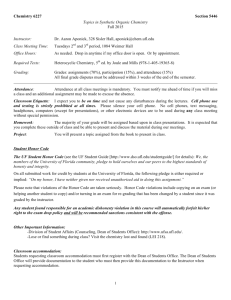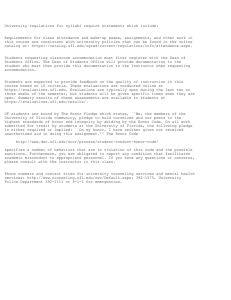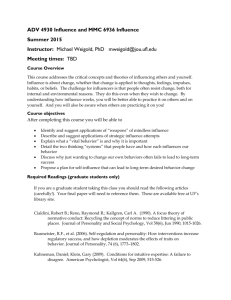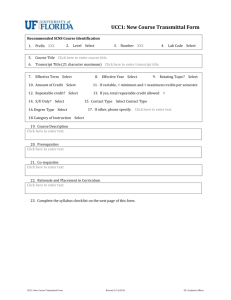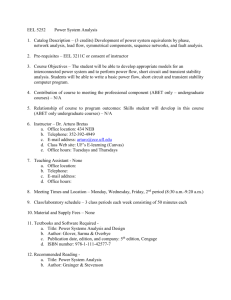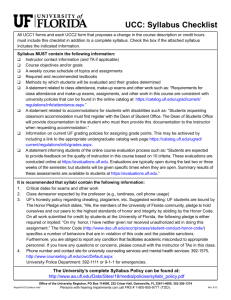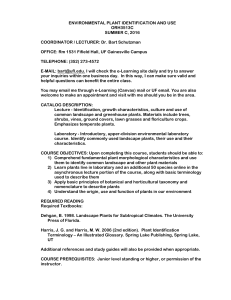University of Florida College of Public Health and Health Professions
advertisement
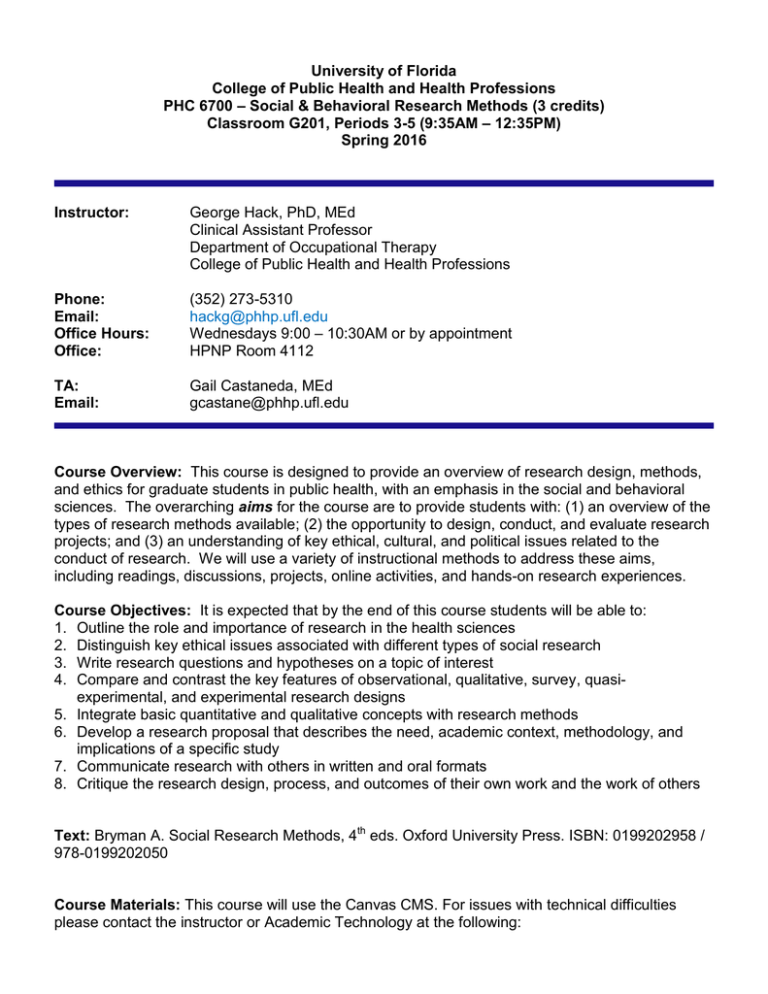
University of Florida College of Public Health and Health Professions PHC 6700 – Social & Behavioral Research Methods (3 credits) Classroom G201, Periods 3-5 (9:35AM – 12:35PM) Spring 2016 Instructor: George Hack, PhD, MEd Clinical Assistant Professor Department of Occupational Therapy College of Public Health and Health Professions Phone: Email: Office Hours: Office: (352) 273-5310 hackg@phhp.ufl.edu Wednesdays 9:00 – 10:30AM or by appointment HPNP Room 4112 TA: Email: Gail Castaneda, MEd gcastane@phhp.ufl.edu Course Overview: This course is designed to provide an overview of research design, methods, and ethics for graduate students in public health, with an emphasis in the social and behavioral sciences. The overarching aims for the course are to provide students with: (1) an overview of the types of research methods available; (2) the opportunity to design, conduct, and evaluate research projects; and (3) an understanding of key ethical, cultural, and political issues related to the conduct of research. We will use a variety of instructional methods to address these aims, including readings, discussions, projects, online activities, and hands-on research experiences. Course Objectives: It is expected that by the end of this course students will be able to: 1. Outline the role and importance of research in the health sciences 2. Distinguish key ethical issues associated with different types of social research 3. Write research questions and hypotheses on a topic of interest 4. Compare and contrast the key features of observational, qualitative, survey, quasiexperimental, and experimental research designs 5. Integrate basic quantitative and qualitative concepts with research methods 6. Develop a research proposal that describes the need, academic context, methodology, and implications of a specific study 7. Communicate research with others in written and oral formats 8. Critique the research design, process, and outcomes of their own work and the work of others Text: Bryman A. Social Research Methods, 4th eds. Oxford University Press. ISBN: 0199202958 / 978-0199202050 Course Materials: This course will use the Canvas CMS. For issues with technical difficulties please contact the instructor or Academic Technology at the following: Email: Phone: Web: learning-support@ufl.edu (352)392-HELP – select option 2 https:/lss.at.ufl.edu/help.shtml Course Requirements Quizzes (Weekly, Online) There will be weekly quizzes to assess your comprehension of concepts and knowledge of requisite information needed to be successful in this course. The quizzes are in the Canvas course site, are timed, and are directly related to each week’s required readings. You will have 2 attempts to complete each quiz and the highest score will be recorded. These quizzes will help you evaluate your understanding of course content by providing you feedback on your performance. Professionalism (Preparation, In-class Contributions, and Occasional Outside Activity) All students will be expected to contribute during in-class activities, team-based problem solving, and online activities. Since research is most often done in teams, your contributions to your assigned team will also count toward professionalism. Research Proposal (Due 4/15/16) You will complete a research proposal over the course of the semester with opportunities to submit sections in stages. I will provide you feedback on these sections to improve your final submission. A detailed rubric will be provided on the Canvas course site with explicit expectations. The final research proposal will be written in APA style (6th edition) and include a title page, abstract (200 words), introduction, literature review, methods, as well as a reference page. The paper should be double spaced, have 1-inch margins, and use Arial 11 font. The proposal must be between10 and 15 pages, excluding the references. All proposals will be submitted to Turnitin when submitting on Canvas. Further details of this assignment will be available on the Canvas course site. Group Research Proposal Presentation (Due: 4/14/16) Your team will prepare and deliver a presentation of proposed research on a chosen topic. Presentations should include the following: Introduction: The introduction should include a brief statement of the problem and purpose, and include any definitions of constructs. Significance of the Study: This should include a rationale justifying why the study is worthy of the work that will be involved. Research Question and Hypothesis: This should include specific language that identifies all variables or potential phenomena Methods: This section should encompass the typical components discussed under the “Methods” section. Discussion: Discuss the strengths and limitations of your study. What are the bigger implications of your findings? How should we proceed? PowerPoint or any other presentation software may be used for this assignment. Further details will be provided in class several weeks before the due date. Grading Point Distribution: Quizzes – 20 points Professionalism – 15 points Research Proposal – 40 points Group Research Proposal Presentation – 25 points Late Work: Will not be accepted unless arrangements have been made ahead of the due date with the instructor. Grading Scale: The final grade will be computed on the basis of the following assessments: Points earned Letter Grade Letter Grade Grade Points 93-100 90-92 87-89 83-86 80-82 77-79 73-76 70-72 67-69 63-66 60-62 Below 60 A A- B+ B B- C+ C C- D+ D D- E A A- B+ B B- C+ C C- D+ D D- E WF I NG S-U 4.0 3.67 3.33 3.0 2.67 2.33 2.0 1.67 1.33 1.0 0.67 0.0 0.0 0.0 0.0 0.0 Academic Integrity: Each student is bound by the academic honesty guidelines of the University that state: “The students of the University of Florida recognize that academic honesty and integrity are fundamental values of the university community. Students who enroll at the university commit to holding themselves and their peers to the high standard of honor required by the honor code. Any individual who becomes aware of a violation of the honor code is bound by honor to take corrective action. The quality of a University of Florida education is dependent upon community acceptance and enforcement of the honor code.” And, each student, upon submission of an assignment, implies the pledge: "On my honor, I have neither given nor received unauthorized aid in doing this assignment." It is your individual responsibility to know and comply with all university policies and procedures regarding academic integrity and the Student Honor Code. Violations of the Honor Code at the University of Florida will not be tolerated. Violations will be reported to the Dean of Students Office for consideration of disciplinary action. For additional information regarding Academic Integrity, please see Student Conduct and Honor Code or the Graduate Student Website for additional details: https://www.dso.ufl.edu/sccr/process/student-conduct-honor-code/ http://gradschool.ufl.edu/students/introduction.html Please remember cheating, lying, misrepresentation, or plagiarism in any form is unacceptable and inexcusable behavior. SUPPORT SERVICES Accommodations for Students with Disabilities If you require classroom accommodation because of a disability, you must register with the Dean of Students Office http://www.dso.ufl.edu within the first week of class. The Dean of Students Office will provide documentation to you, which you then give to the instructor when requesting accommodation. The College is committed to providing reasonable accommodations to assist students in their coursework. Counseling and Student Health Students sometimes experience stress from academic expectations and/or personal and interpersonal issues that may interfere with their academic performance. If you find yourself facing issues that have the potential to or are already negatively affecting your coursework, you are encouraged to talk with the instructor and/or seek help through University resources available to you. The Counseling and Wellness Center 352-392-1575 offers a variety of support services such as psychological assessment and intervention and assistance for math and test anxiety. Visit their web site for more information: http://www.counseling.ufl.edu. On line and in person assistance is available. You Matter We Care website: http://www.umatter.ufl.edu/. If you are feeling overwhelmed or stressed, you can reach out for help through the You Matter We Care website, which is staffed by Dean of Students and Counseling Center personnel. The Student Health Care Center at Shands is a satellite clinic of the main Student Health Care Center located on Fletcher Drive on campus. Student Health at Shands offers a variety of clinical services. The clinic is located on the second floor of the Dental Tower in the Health Science Center. For more information, contact the clinic at 392-0627 or check out the web site at: https://shcc.ufl.edu/ Crisis intervention is always available 24/7 from: Alachua County Crisis Center: (352) 264-6789 http://www.alachuacounty.us/DEPTS/CSS/CRISISCENTER/Pages/CrisisCenter.aspx BUT – Do not wait until you reach a crisis to come in and talk with us. We have helped many students through stressful situations impacting their academic performance. You are not alone so do not be afraid to ask for assistance. Course Schedule WEEK 4 Topics Course Introduction Canvas Site Review Ch. 1: The nature and process of social research (pp.1 – 16) Ch. 6: Ethics and politics in social research (pp.129 – 154) Ch. 3: Research designs (pp.44 – 77) Ch. 4: Planning a research project and formulating research questions (79 – 95) Ch. 2: Social research strategies (pp.18 – 42) WEEK 5 Ch. 5: Getting started: reviewing the literature (pp.97 – 128) WEEK 6 Ch. 7: The nature of quantitative research (pp.159 – 182) WEEK 7 Ch. 17: The nature of qualitative research (pp.379 – 413) WEEK 8 Ch. 8: Sampling in quantitative research (pp.183 – 206) Ch. 18: Sampling in qualitative research (pp.415 – 429) WEEK 9 Spring Break (February 29 ---- March 4) Ch. 9: Structured interviewing (pp.208 – 230) Ch. 20: Interviewing in qualitative research (pp.468 – 498) WEEK 10 Ch. 10: Self-completion questionnaires (pp.231 – 243) Ch. 11: Asking questions (pp.245 – 267) WEEK 11 WEEK 12 Ch. 21: Focus groups (pp.500 – 520) Ch. 12: Structured observation (pp.269 – 286) Ch. 15: Quantitative data analysis (pp.329 – 341) WEEK 13 Ch. 24: Qualitative data analysis (pp.564 – 588) WEEK 14 Group Research Proposal Presentations Course Wrap-Up WEEK 1 WEEK 2 WEEK 3
